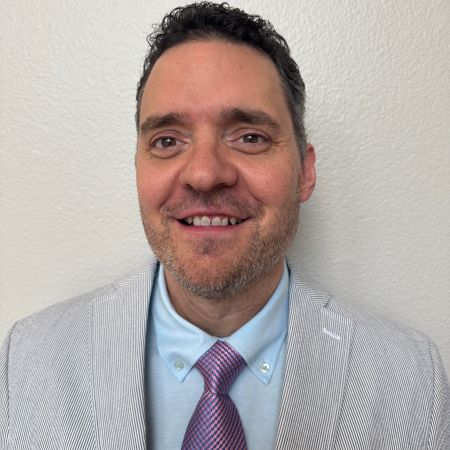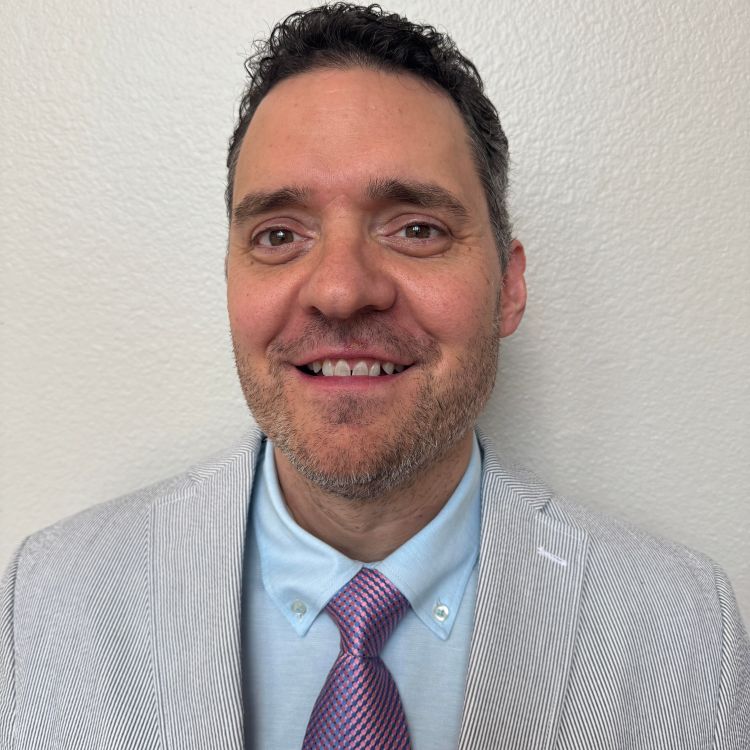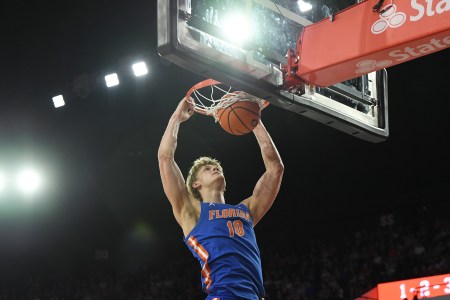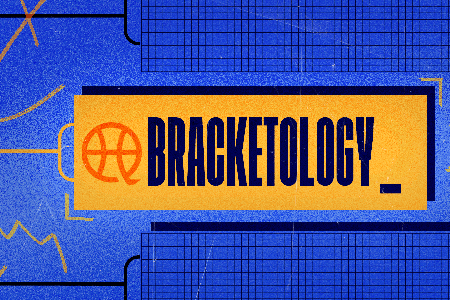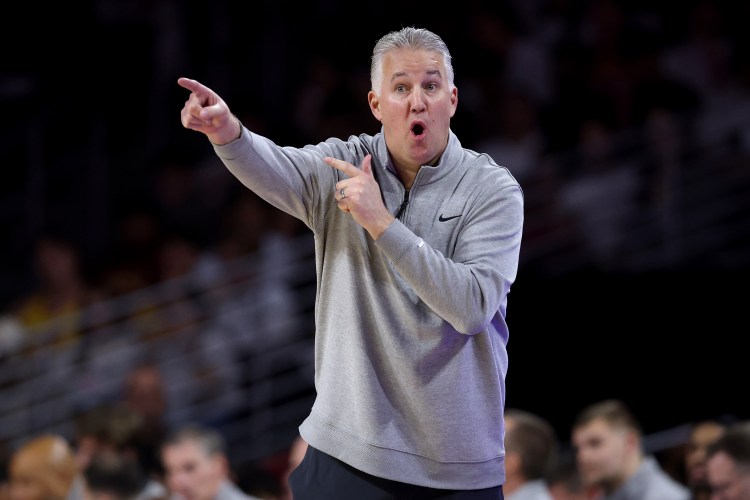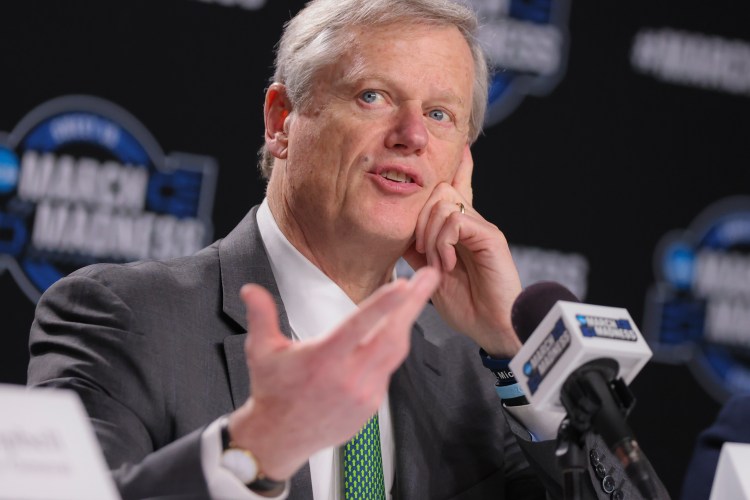SAN ANTONIO — Todd Golden was born in 1985, back when Kelvin Sampson still sought out a pay phone after every Montana Tech victory to make two calls: one to the sports editor of the local newspaper and one to the guy who operated the power plant so he could light up the giant ‘V’ on the mountain that overlooked Butte.
At a time when college sports is facing its own crossroads on so many fronts — with a fully professionalized future colliding with the industry’s old-school tenets — it’s only fitting that we have a massive generational coaching divide showcased here in Monday’s national title game.
But with all the differences in age and career arc between Florida’s Golden, 39, and Houston’s Sampson, 69, the two are bonded by one element: the resiliency of their teams. Both No. 1 seeds have taken on significant water in multiple games during this NCAA Tournament, most notably in Saturday’s national semifinals. But both remain alive, one win shy of a national championship.
Throughout Final Four history, there have been other notable flashpoints of young versus older in national title games, including Butler’s Brad Stevens against Duke’s Mike Krzyzewski in 2010; N.C. State’s Jim Valvano against Houston’s Guy Lewis in 1983; and Kentucky’s Adolph Rupp against Texas Western’s Don Haskins in 1966. We saw the largest age disparity — 34 years — when Stevens lost to UConn’s Jim Calhoun in the 2011 final.
All those clashes occurred in unique eras, as will Monday night’s championship game. The changing landscape, be it unfettered annual free agency or lucrative NIL player contracts, has played a role in early departures of several notable coaches from the college game. Set against that backdrop, it makes Monday’s coaching matchup all the more alluring.
Consider what Sampson began scrolling through on his phone in the wee hours of Sunday morning, one text after another from long-standing members of the old guard in the coaching fraternity: Tom Izzo, Rick Barnes, Tubby Smith, Gregg Popovich.
“They all kind of had similar messages,” Sampson said. “Win one for the old guys, something like that.”
He chuckled.
“He put blood, sweat and tears into the program”
A win would make Sampson the oldest coach ever to win the men’s national title.
His son and assistant, Kellen, told Hoops HQ on Sunday that if one watched his dad for the final 10 minutes of the comeback against Duke, you’d see how he leaned into all four-plus decades of coaching experience to navigate treacherous waters.
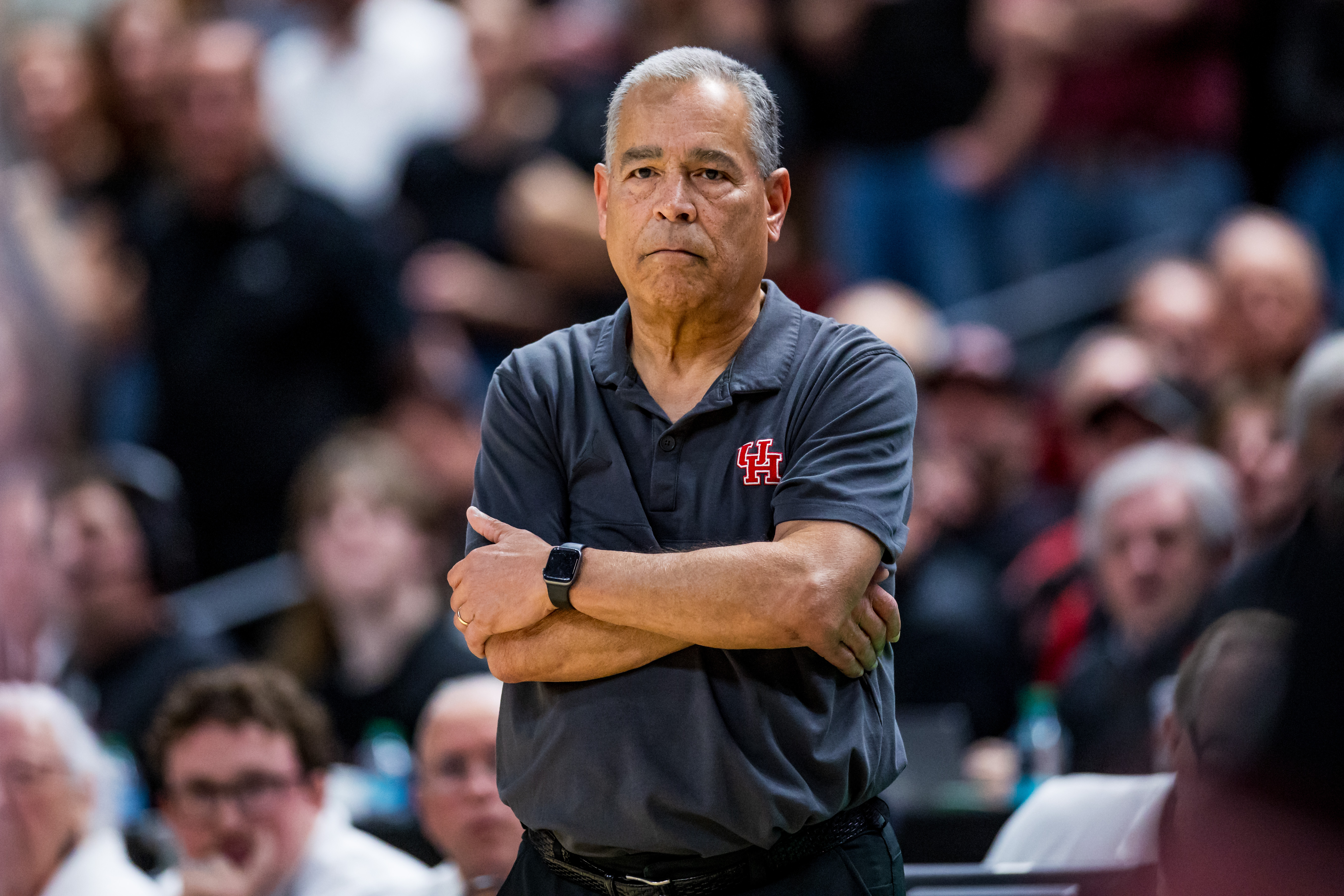
After Joseph Tugler committed an ill-advised technical foul in the final minutes, Sampson exuded calm, letting the aggressive player breathe and refocus. And faced with a dilemma — foul or not down six points? — he chose to believe in his team’s ethos: defense and rebounding. His instincts paid off.
Sampson’s an anomaly, stressing old-school tenets in a new-school world. Spend any time with him and he’ll spin tales of how confrontation with players is good, how players need to “surrender” to culture, how his team’s toughness is steeled when no one is watching — when players run 18 100-yard sprints at 6 a.m. in June before the Texas sun takes hold.
All this during a time when a revolving door exists on many campuses, with players switching schools like summer AAU teams.
“These guys came here knowing he was that way,” Kellen Sampson said. “It’s not like he was Santa Claus and the Easter Bunny in the recruiting process. Each and every one of these guys chose hard. You eventually do what he wants you to do because you get tired of hearing his voice, and you end up doing what he wants because you end up falling in love with him and you don’t want to let him down. Your heart bursts to do it. It’s a two-, three-year journey.”
Or a six-year journey.
“At first I didn’t know why he was screaming at me so much,” Houston’s six-year big man J’Wan Roberts said. “I didn’t know why he ran me so much … I just surrendered. He put in so much blood, sweat and tears into the program.”
Sampson’s late mother always told him to learn how to “smell the roses.”
“I never learned,” Sampson said.
Sampson’s successful college career has come a long way since his mentor Jud Heathcote called him after Montana Tech went 4-22 in his first season with a message that still sticks with him: “Hey, Kel, I just want to congratulate you. You’re the only coach in captivity that possibly could have taken Montana Tech from obscurity to oblivion. Gotta go, Kel.”
After leading Oklahoma to the 2002 Final Four, Sampson’s career, of course, veered off course when in 2008 the NCAA gave him a five-year show-cause for making excessive phone calls to recruits while coach of Indiana. That led him to spend six years as an NBA assistant, believing he would never return to the college ranks.
He returned to surround himself with his family, including Kellen and daughter Lauren, Houston’s director of operations. Eleven years later, he’s authored one of the greatest rebuilding jobs in the sport’s modern era.
“Kelvin has got this thing humming,” proud Houston alum and longtime voice of the Final Four, Jim Nance told Hoops HQ and a few reporters in the minutes after Houston’s victory over Duke. “We’ve dealt with heartache a lot of times. Tonight soothes a lot of those.”
“A super relatable guy, a player’s coach”
Despite his youth, it’s hard to paint Golden with a broad brush as a completely new-school coach when he developed his foundation playing for Randy Bennett, who has long espoused successful, old-school principles.
A native of Phoenix, Golden believes a large part of who he has become as a head coach stems from playing for Bennett and then-assistant Kyle Smith at Saint Mary’s.
“They gave me my backbone as a coach,” Golden said.
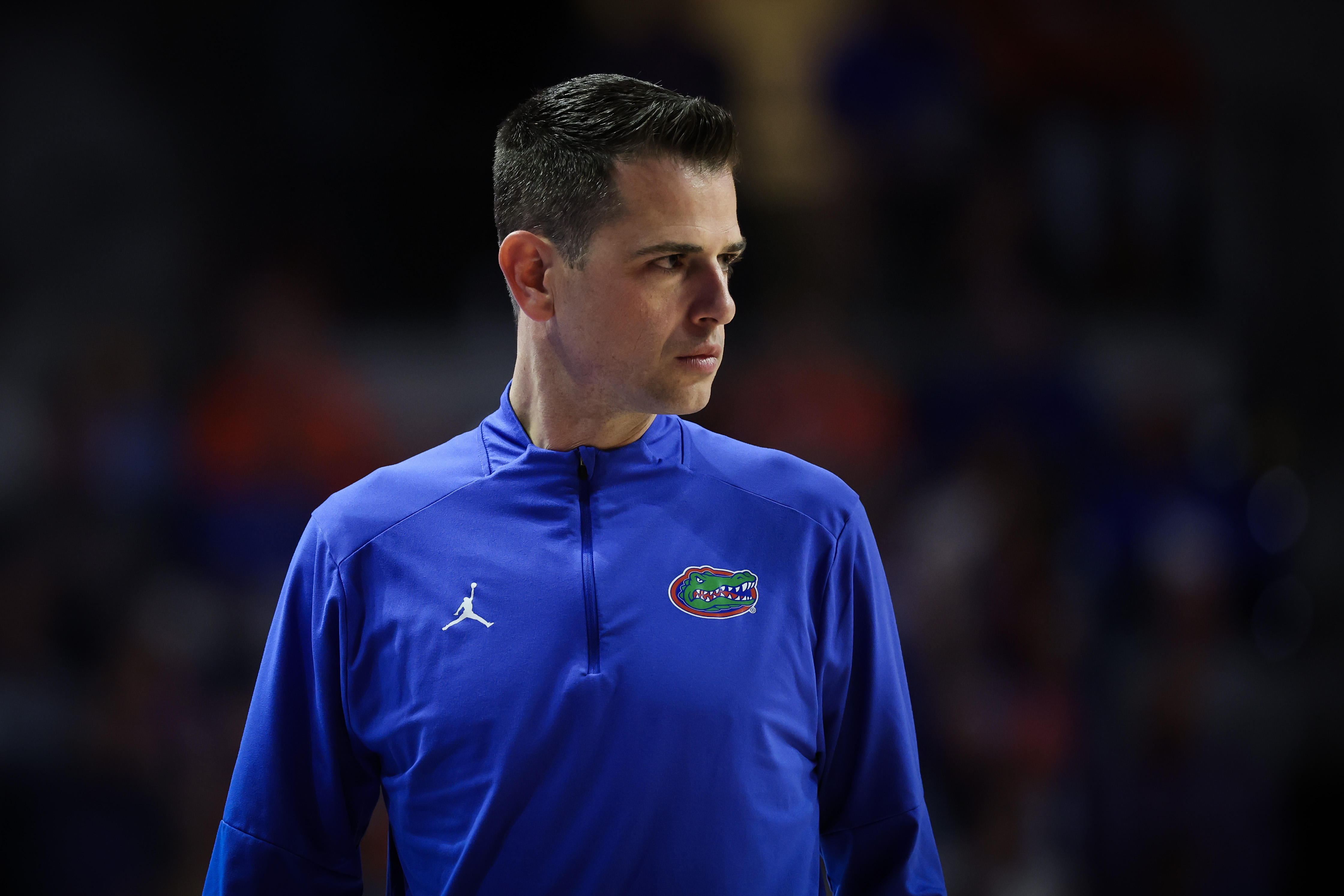
He arrived on the idyllic Moraga, California, campus as a walk-on having just turned 18, weighing all of 150 pounds and oozing what he calls “irrational confidence.” Bennett made clear that the road would not be easy.
Bennett would get on him about playing too much fantasy baseball. Smith always challenged his toughness and made sure he was competing all the time.
The biggest lesson that shaped Golden’s coaching philosophy was that Saint Mary’s was a program that was a true meritocracy. It didn’t matter that Golden was a walk-on. He broke into the lineup as a redshirt sophomore. And he became a senior starter.
Smith and Golden laugh about those years all the time.
“If you’re able to make it through the Saint Mary’s program, you kind of get a badge of honor,” Golden said. “You have to be pretty tough to make it there.”
A lot of what Golden does at Florida mimics what he learned at Saint Mary’s, be it leaning into analytics or not worrying about how many stars accompany recruits.
At Florida, like most of his peers, Golden has clearly gone head-first into the transfer portal, boasting four starters who are transfers on a team that won the conference tournament in arguably the strongest league the sport has ever seen.
“He’s one of the guys,” Florida’s Thomas Haugh said. “He’s at practice running around with us. He’s a super relatable guy, a player’s coach. You don’t see that nowadays. It creates a bond within our team that’s leading to the success we’re at right now.”
From three mostly successful seasons as San Francisco’s head coach, including leading USF to the 2022 NCAA Tournament, to his three-year run in Gainesville, Golden has become one of the rising stars in the coaching ranks. But it’s a brief career that has not been devoid of allegations of impropriety.
In September, a formal complaint was filed with the Title IX office at Florida against Golden. It included allegations of sexual harassment, sexual exploitation and stalking from multiple women, including students. On Jan. 27, Florida closed the four-month investigation, announcing that the probe found “no evidence” that Golden violated Title IX.
On the court, Golden’s career continues to flourish, putting the Gators on the brink of winning their first national title since Billy Donovan won back-to-back titles in 2006 and 2007.
“Probably happened a little faster than some people thought it might,” Golden said of his ascension. “But we’re here now and we’re 40 minutes away from being national champs. We have to beat an incredibly difficult team on Monday night — but we’re in the arena.”
Two coaches will meet in the arena having risen from vastly different career journeys. As college sports continues to grapple broadly with its own past versus future collision of financial models, the collision of Golden and Sampson will spotlight a generational divide — two men separated by age but bonded by the resiliency of their teams.
